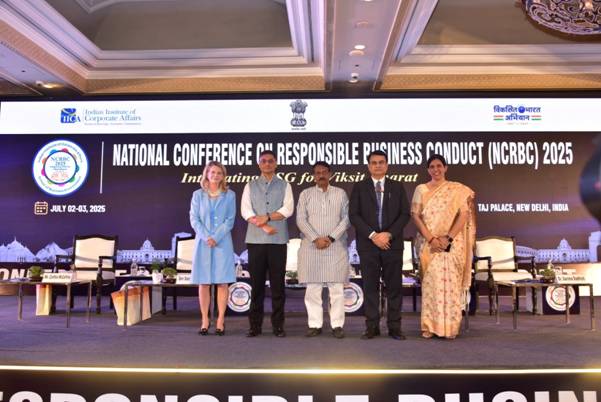The third edition of the National Conference on Responsible Business Conduct (NCRBC) 2025 was inaugurated on 2nd July at the Taj Palace, New Delhi, by Shri Harsh Malhotra, Minister of State for Corporate Affairs and Road Transport & Highways. Hosted by the Indian Institute of Corporate Affairs (IICA) under the Ministry of Corporate Affairs, the two-day national-level event is being held under the theme “Integrating ESG for Viksit Bharat.”
The event gathered over 300 senior business leaders, ESG professionals, policymakers, and international delegates for high-level dialogues on corporate responsibility, sustainability, and governance innovation.
“From Compliance to Conscience”: Minister Highlights India’s New Governance Paradigm
In his inaugural address, Shri Harsh Malhotra emphasized a shift in India’s corporate landscape from regulatory prosecution to trust-based corporate governance. Drawing from the philosophy of ‘Vasudhaiva Kutumbakam’, he noted that India’s ESG approach is climate-plus, extending beyond environmental action to include social inclusion, ethical governance, and intergenerational equity.
The Minister outlined key reform initiatives by the Ministry of Corporate Affairs, including:
-
National Guidelines on Responsible Business Conduct (NGRBC)
-
Business Responsibility and Sustainability Reporting (BRSR)
-
MCA21 Version 3.0 for digital governance
-
Decriminalisation of over 180 statutory provisions under the Jan Vishwas Act
He applauded IICA’s role in strengthening board ethics and promoting ESG capacity-building across the spectrum — from startups and MSMEs to large corporations.
India’s ESG Path Must Be Contextual, Not Imported
Shri Sanjeev Sanyal, Member of the Economic Advisory Council to the Prime Minister, offered a sharp critique of importing subjective ESG metrics from developed countries. He cautioned against global indices that ignore India’s unique development context and highlighted the historical depth of India’s ethical frameworks, referring to Kautilya’s Arthashastra as an early embodiment of responsible statecraft.
He called for robust, indigenous, and just indicators that align with India’s long-term social and economic priorities, warning against rigid compliance with globally driven ESG expectations that may not serve national needs.
Children and Families Central to ESG
In a compelling special address, Ms. Cynthia McCaffrey, UNICEF Representative to India, stressed that ESG goals must consider the lived realities of children and families. She asserted that no ESG model is complete without investing in child health, nutrition, education, and family welfare, urging businesses to embed these social dimensions into their broader sustainability strategies.
IICA’s Vision: ESG Rooted in Indian Realities
Delivering the welcome address, Shri Gyaneshwar Kumar Singh, Director General and CEO of IICA, reflected on the decade-long journey of the Ministry in shaping India’s ESG framework. He emphasized that imported ESG models are inadequate, and India must lead with evidence-based, locally grounded, and sector-specific approaches.
He affirmed IICA’s continued role in:
-
ESG policy research
-
Capacity building
-
Sectoral framework development
-
Mainstreaming responsible business practices across formal and informal sectors
Shifting from Commitment to Convergence
Prof. Garima Dadhich, Head of IICA’s School of Business Environment, highlighted the evolution of NCRBC, noting that this year’s edition reflects a significant transition from “awareness to action”. She underscored IICA’s dedication to building a collaborative national ecosystem where responsible business conduct becomes central to India’s developmental narrative.
High-Level Panel Discussions on ESG Transformation
Day 1 featured four thematic panels that explored:
-
The Rise of ESG in the Boardroom
Led by representatives from the Mahindra Group, Engineers India Ltd, ICAI, NSE, and ONGC, the session discussed integrating ESG into board-level decision-making and fiduciary duties. -
Sustainable Finance for a Green Future
Focused on green bonds, sustainability-linked loans, and impact investing, with insights from SEBI, NABARD, Indian Banks’ Association, and India INX. -
Global Due Diligence and Indian Exporters
Addressed the implications of the EU Corporate Sustainability Due Diligence Directive (CSDDD) on Indian supply chains and exporters. -
The Workforce of the Future
Explored the role of ESG in workforce planning, skills development for green jobs, and inclusive employment strategies.
Looking Ahead: Day 2 Agenda
The second day of NCRBC 2025 will continue with sessions on:
-
Decarbonising India’s industrial sectors
-
Sector-specific ESG frameworks
-
Aligning Indian BRSR disclosures with global standards
-
Building sustainable and resilient supply chains
-
A diplomatic panel on multilateral ESG cooperation
The conference is supported by leading institutions including UNICEF India, Partners-in-Change, ICAI, ACCA, GAIN, ATNi, ILO, and the Responsible Business Alliance.
NCRBC 2025 is more than a policy forum — it is a milestone in India’s journey toward becoming a developed, responsible, and ethically grounded economy by 2047. As ESG moves to the center of India’s governance and development agenda, the event reflects a growing consensus that sustainability, inclusion, and accountability are not only desirable — they are essential.



